To My Brother Who Feels 'Helpless' in the Face of My Illness
Some time ago I was telling you about my next treatment options. Doctor A wants to try this drug, Doctor B wants to try this one, Doctor C wants to wait and think about it. We got about as far as Dr. G before you interrupted this laundry list.
“I feel helpless,” you said, struggling to understand my condition, potential treatments, risks involved and ultimately if I could regain my quality of life you watched steeply decline.
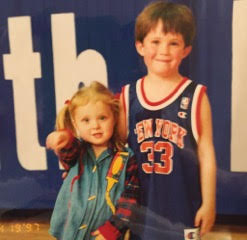
I realized after this conversation something I wish I had recognized a lot sooner. You see, for as long as I can remember I believed doctors were so intelligent they almost had magical powers. If you “didn’t feel well” you would go to the doctor, who would diagnose your problem, offer proper treatment and ultimately you would be cured. If it didn’t work that way you could seek alternate care or accept that there may be nothing wrong with you.
I don’t understand why I had this notion, and those around me were surprised that I had such high regard for doctors and medicine. We never really knew a dad that was healthy. His struggle with clinical depression began before we were even born, and only continued as we got older when he was also diagnosed with a rare genetic disorder resulting in poorly controlled widespread pain. Ultimately though, it would be a short battle with prostate cancer that would take him away from us. He saw the top specialists nationwide, and even they couldn’t offer him the magical powers doctors were supposed to have.
And then it was my turn. I soon found myself as the patient with a series of strange symptoms and lab results that suggested my body was attacking itself, but not much more than that was understood. And even as I developed episodes of dizziness and fainting, visual loss and cognitive dysfunction and fevers and joint pain, to name a few, I believed I’d see a doctor who’d diagnose, treat and cure my condition.

I’ve been fortunate to see the world’s leading experts around the country from the Mayo Clinic, Harvard, Cornell and many in between. And I want to be clear on something: I am grateful for everyone I have seen and those who are part of my “medical team.” I do believe my doctors want to lessen my struggling in any way they can. I know if they could end the pain they would. Recently though, answers are few and far between. Unknowns are plenty and confidence is often low. If doctors are the only ones capable of helping but are not offering magical solutions, what happens now? Feelings of helplessness pumped through my blood, increasing in concentration as symptoms progressed.
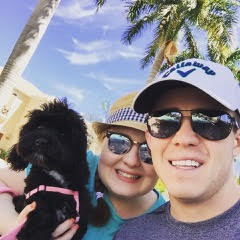
Here is the thing, though, that I’ve only recently come to realize: the most powerful forces treating a chronic illness are not always doctors. They are not even always medical professionals at all. For me, my “helpless” brother was actually providing even more relief than any doctor could offer me. Siblings don’t always have the answers that doctors have, but doctors never have the answers that my brother has had.
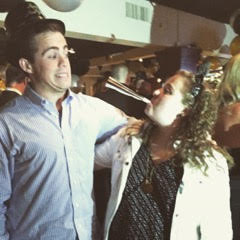
I don’t think any doctor has restored any amount of life quality as much as you have. You, my brother, are just as important, if not more important, than anyone wearing a white coat or stethoscope. You may not understand my condition (I don’t believe my doctors believe they fully understand it either) or any of the proposed treatments, and that’s OK. It is OK if you can’t play quarterback because it’s not your position. Perhaps you’re the wide receiver or running back. Just because you can’t play quarterback doesn’t make you any less important on the team. Without the other positions a quarterback would have no one to throw to. You’ve been the wide receiver and I’m only sorry I didn’t see that sooner. So, to my wide receiver who may be feeling helpless, I want to remind you of 10 ways in which you have and continue to score touchdowns every single day. Without you on the team there would be no team and dwindling hope for my future.
1. You never let me give up, no matter how badly I want to.

2. You don’t admit to knowing when you really don’t, yet offer advice on things you really do.


3. You validate.

4. You give me perspective.

5. You cheer. You motivate. You encourage.

6. Even when I’m doing nothing I’m doing something.

7. You remind me of my strength when I feel defeated.

8. You’ve opened yourself to learning.

9. You care about me and my future even when I can’t or don’t want to.

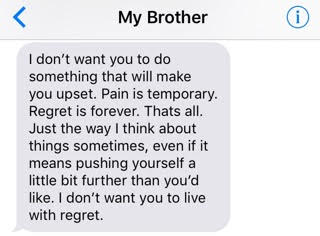
10. No matter what symptom or treatment is next, I’m never alone.

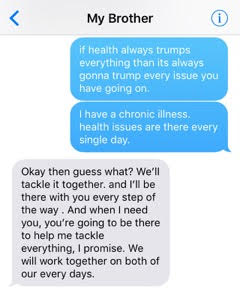
We want to hear your story. Become a Mighty contributor here.
